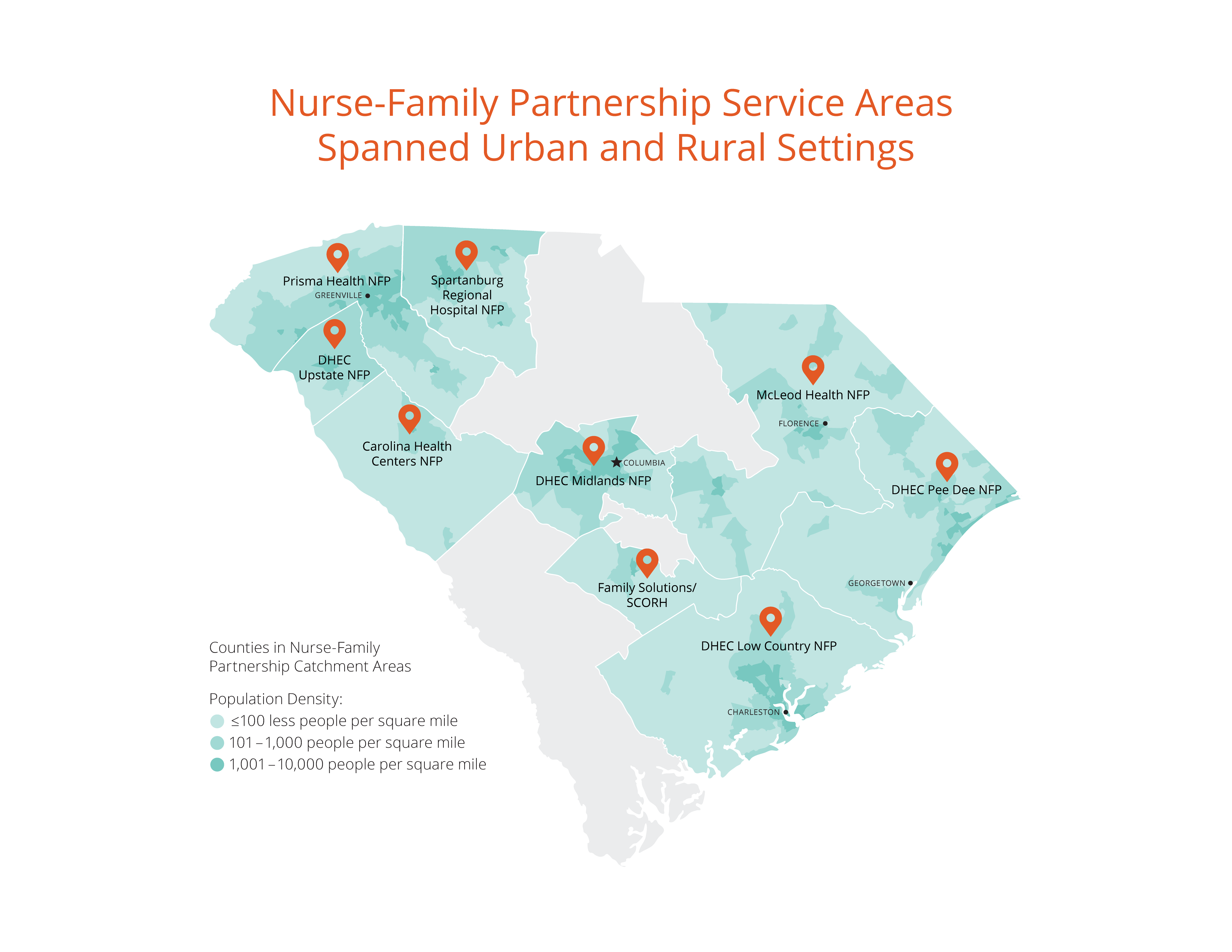The South Carolina Nurse-Family Partnership Study is a landmark evaluation of the effects of a large-scale nurse home visiting program for mothers and their children.
Policy Motivation
Prenatal and early childhood interventions may have the potential to improve health and other outcomes across the life course. These services are not, however, traditionally funded through Medicaid, and there have been relatively few rigorous evaluations measuring the causal impact of large-scale preventive programs in early childhood. This evaluation will provide policymakers with evidence on the effectiveness of a nurse home visiting program delivered at scale to first-time Medicaid-eligible mothers. It will inform decisions to leverage Medicaid funding to improve outcomes through a wider range of services.
A Randomized Evaluation to Learn
This evaluation is based on a four-year expansion of Nurse-Family Partnership led by the South Carolina Department of Health and Human Services with the goal of better understanding program impacts and how best to scale this program. The expansion of Nurse-Family Partnership services was enabled by a Pay for Success contract that coupled $17 million in philanthropic funding with a Medicaid waiver that supported the project’s costs. As part of the project, the State commissioned the landmark South Carolina Nurse-Family Partnership Study to rigorously evaluate the program’s effects, and agreed to make success payments to fund further home visiting services if pre-determined success metrics were met. The study team is using South Carolina’s linked administrative data system to track a wide range of outcomes related to families’ health and well-being.
Nurse-Family Partnership is a national maternal and child health program serving nearly 40,000 families in 40 states, the U.S. Virgin Islands and many Tribal communities. Nurse-Family Partnership pairs each first-time mother with her very own personal nurse who provides her with home visits starting during her pregnancy until her child’s second birthday. Beginning in 1977, the impact of the Nurse-Family Partnership has been studied in three randomized controlled trials which found positive outcomes on the health and well-being for mothers and their children.
From April 2016 through March 2020, the Harvard and J-PAL study team worked with NFP nurses to enroll a total of 5,655 first-time Medicaid-eligible mothers into the study across urban and rural areas in South Carolina. This was the fastest statewide expansion of the Nurse-Family Partnership. Approximately two-thirds of study participants were randomly assigned to receive Nurse-Family Partnership’s services while the remaining moms received the usual care available to Medicaid-eligible mothers in their communities. The study team is using South Carolina’s linked administrative data system to track outcomes over a 30-year period. This administrative data will enable the study to learn about Nurse-Family Partnership’s impact on a broad range of outcomes, including not only health but also education, economic outcomes, and more.

The results from the randomized controlled trial are forthcoming.
Study enrollment ended in March 2020, and results from the academic analysis will be released once enough time has elapsed for births and subsequent outcomes to be observed for all of the study participants. Please subscribe to be notified when this page is updated.
Visit the Pay for Success page to learn about the interim outcomes of the Pay for Success project, released in Spring 2021.
How this study adds to prior evidence
Beginning in 1977, three randomized controlled trials of the Nurse-Family Partnership have been conducted in New York, Colorado, and Tennessee. The three trials found positive outcomes on health and well-being for mothers and their children. Families have been studied over 20 years and continue to be studied today. This evidence has informed the scale up of Nurse-Family Partnership’s model with government and philanthropic resources.
The South Carolina Nurse-Family Partnership Study adds to the prior evidence by addressing the following key questions:
- What can we learn about the comprehensive impact of the Nurse-Family Partnership by looking at a wide range of health and well-being outcomes across large-scale, linked, longitudinal administrative data sets over a long time-horizon?
- What is the impact of Nurse-Family Partnership when provided via a Medicaid waiver to reach a broader population (first time pregnant women eligible for Medicaid) instead of when targeted at the most vulnerable?
- How has the impact of the Nurse-Family Partnership changed in the 20 years since the initial studies? How do changing contexts–such as teen pregnancy rates, smoking rates, and the availability of long-lasting reversible contraceptives–affect the program’s impact?
Primary Study Outcomes
The trial’s primary outcomes are:
Adverse birth outcomes: We define this outcome as having a preterm birth (less than 37 weeks’ gestation), or a newborn being small for gestational age (less than 10th percentile of US births conditional on gestational age) or having low birth weight (less than 2,500 grams), or experiencing perinatal mortality (fetal death at or after 20 weeks of gestation or mortality in the first 7 days of life).
Major childhood injury, suspected abuse, or neglect: We define this outcome as having a health care encounter or mortality associated with International Classification of Diseases (ICD) codes indicating either a major child injury, or suspicion of abuse or neglect.
Birth spacing: We define this outcome based on whether a subsequent birth occurs less than 21 months after the birth of the child born from the pregnancy during which the mother was enrolled in the study.
Long-Term Outcomes
The study will examine the long-term causal effects of the NFP program on a range of outcomes including: maternal and child health, child school-readiness and performance, maternal educational attainment, criminal justice involvement, and use of government programs and social services such as SNAP and Medicaid.
Please note that the outcomes defined in the academic study differed from the outcomes defined in the Pay For Success contract. Please visit the Pay for Success page for more details.
Sign up for updates about the project and study here.